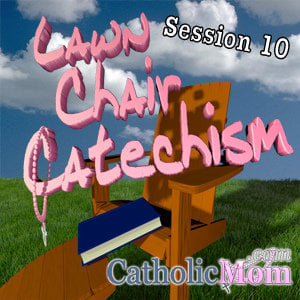
Welcome to the 10th session of Lawn Chair Catechism, using Forming Intentional Disciples: The Path to Knowing and Following Jesus, by Sherry Weddell (Our Sunday Visitor, 2012).
A few notes:
- You'll be able to leave comments and/or leave your link at the end.
- You do not have to read the book to participate. Check out our discussion guide. There's plenty to get started with if that's all you use (one page a week).
This week, we'll be covering Chapter 10: Break the Silence.

Summary:
Setting goals and following through with a plan of action can transform a parish. A realistic five-year goal is to strive to double the percentage of active disciples in the parish. This is done via an intentional strategy of sustained prayer and effort.
While we cannot make anyone “drop their nets” any more than a gardener can make a seed germinate, we can intentionally and intelligently work to create an environment that is conducive to discipleship. We can intentionally shape the atmosphere, experiences, structures, and spiritual culture of our parish life so that it fosters the journey that Jesus Christ asks all of us to make: following him.
Sherry Weddell outlines a series of steps that parishes can take to foster this culture of active faith. In this chapter she discusses the first of several elements of the step she calls “Break the silence”.
The first thing that must be done is to deliberately and persistently break the code of silence if it is in place. The Catholic norm of silence about a relationship with God, about Jesus Christ and his story, about our own stories of following Christ, and about the need for everyone to decide whether or not he or she will follow as a disciple is stifling the emergence of a culture of discipleship and all that flows from it.
A “threshold conversation” is the practice of asking others about their relationship with God, and then listening.
A threshold conversation is a supportive, inviting, open-ended, prayerful act of listening evangelization. . . . During this conversation, we focus on listening to the other and set aside the need to share our own story. Neither is it counseling or apologetics, and certainly a threshold conversation is never judgmental.
A threshold conversation can begin with an opening question, such as “Can you tell me about your relationship with God to this point in your life?” Do not settle for labels, but ask clarifying questions to better understand what the individual thinks and feels about God.
The second essential question is, “If you could ask God one question that you knew he would answer right away, what would it be?” This question often reveals current needs or struggles that someone in the parish may be able to address.
For discussion:
In your own faith:
- Have you ever listened to a “threshold conversation”? What was it like?
- Can you think back to a time when perhaps you should have listened supportively and asked clarifying questions, and instead you jumped in with catechesis, or apologetics, or giving personal advice?
In your parish:
- Has your parish hosted a discipleship training program that included practice listening to “threshold conversations”?
- What ministries or events at your parish tend to create situations where a threshold conversation might occur?
- How can you prepare lay leaders to listen and respond?
Join the discussion!
We'll be "talking" in the combox, too, so please leave your thoughts there as well!
'); // ]]>
About the Author

Sarah Reinhard
When she’s not chasing kids, chugging coffee, or juggling work, Sarah Reinhard’s usually trying to stay up read just one … more … chapter. She writes and works in the midst of rural farm life with little ones underfoot. She is part of the team for the award-winning Catholic Mom’s Prayer Companion, as well as the author of a number of books.


.png?width=1806&height=731&name=CatholicMom_hcfm_logo1_pos_871c_2728c%20(002).png)
Comments